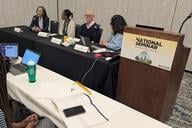You have /5 articles left.
Sign up for a free account or log in.
Many academic groups join in criticizing state or local laws that encourage discrimination of various types. But moving meetings out of those states is frequently complicated and opposed by many association leaders, because hotel and other contracts are signed years in advance and such switches can leave scholarly groups facing large bills.
The Academic Preservation Trust is a small organization, much smaller than the large disciplinary groups that have faced calls to boycott certain cities for events. But the trust has announced it is moving a meeting that will take place this month -- April 18-19 -- from North Carolina to Maryland. Not only is it staying out of the state, but the trust has offered to provide financial assistance to any of the roughly 50 people expected to attend if they must pay change fees on flights. Thus far, people aren't asking for that help and are just changing their travel plans.
The trust is a consortium of higher education institutions that works on preserving digital academic content and provides services related to using such content.
"After recent developments there, the governing board of APTrust has concurred with the recommendation that we not hold our meeting in a location where explicit government policy promotes regressive intolerance, bias and unequal protection of law. We are moving the meeting from North Carolina to Maryland," said a statement on the group's website from Chip German, director of the group. A new North Carolina law, passed with little public notice, bars local governments from passing antibias laws that include sexual orientation or gender identity. Further, the law requires that units of government in the state -- including public colleges and universities -- require their restrooms be used only by people whose biological sex at birth matches the sign on the door.
The APTrust, as it is known, is now going to hold its meetings at Johns Hopkins University, which is providing space needed for the switch.
German's statement also said: "At this point in our history, we recognize the need to demonstrate through our collaborative work that we remain committed to our preservation mission regardless of moments of political challenge for our institutions. Our discussion of this point has been abstract in the past. Today it feels substantially more concrete. It is not too much of a stretch to imagine that the spirit behind the recent North Carolina law could also put at risk the scholarly record and cultural heritage generated by the targeted community. We look forward to the time when we do not have to limit our consideration of venues for our activities in order to stay consistent with our commonly held values. To our colleagues at institutions that happen to be in locations where we will not meet (and it could be any of us at any time), we stand with you as we know you stand with us in appealing to the better nature of human beings while safeguarding their most important accomplishments."
Librarians are tweeting support of the move.




